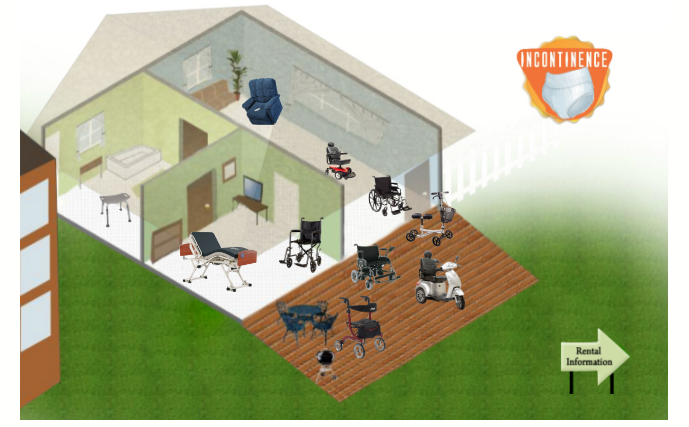What is Home Medical Equipment?

Home medical equipment refers to a wide range of devices, tools, and supplies designed to assist individuals with medical conditions, disabilities, or injuries in managing their healthcare needs in the comfort of their own homes. This equipment is intended to provide medical support, improve mobility, enhance safety, and promote independence for patients who require ongoing care.
Home medical equipment can vary in complexity and purpose, and it can be used for short-term or long-term care. Some common examples of home medical equipment include:
1. Mobility aids: These include manual wheelchairs, power wheelchairs, mobility scooters, and any type of walking aids like walkers, rollators, knee walkers, crutches, and canes which help individuals with limited mobility to move around more easily.
2. Hospital beds and patient lifts: These devices are designed to enhance comfort and safety for individuals with limited mobility or those who require assistance with transferring to and from bed.
3. Lift chairs: Seat lift chairs or power recliners are a cozy, comfortable mobility assistant that help you ease into standing up or sitting down. Some even help you sleep.
4. Bathroom safety equipment: Examples include grab bars, shower chairs, raised toilet seats, and other assistive devices that improve safety and accessibility in the bathroom.
5. Adult incontinence supplies: This includes items such as diapers, pull-ups, pads and liners, under pads, wipes, gloves and ointments for managing bladder leakage and to avoid embarrassment and skin irritation.
It’s important to note that the specific types of home medical equipment can vary depending on the individual’s healthcare needs and the recommendations of their healthcare provider.
How Do I Know What Home Medical Equipment is Right for Me?
Determining the right home medical equipment for your needs involves careful consideration of your medical condition, lifestyle, preferences, and consultation with healthcare professionals. Here’s a step-by-step guide to help you make an informed decision:
1. Consult Your Healthcare Provider: Start by discussing your medical needs and limitations with your primary care physician or relevant specialists. They can provide valuable insights into the specific equipment that could improve your quality of life and help manage your condition.
2. Identify Your Needs: Make a list of the tasks or activities you need assistance with due to your medical condition. Determine whether you need mobility aids (wheelchair, walker, cane), or other specialized equipment.
3. Research and Learn: Educate yourself about the different types of home medical equipment available. Understand their features, benefits, limitations, and maintenance requirements. Our experts at Homepro Medical can also help you narrow down your options by sharing some information and personal preferences.
4. Consider Your Living Space: Evaluate your home environment to ensure that the equipment you’re considering will fit comfortably and safely. Measure doorways, hallways, and any tight spaces to ensure that the equipment can be maneuvered without difficulty.
5. Explore Options: If applicable, consider various models and brands of the equipment you need. Compare features, pricing, warranties, and customer reviews. If you’re unsure, seek recommendations from healthcare professionals, support groups, or online forums.
6. Rentals: At Homepro Medical, we offer rentals within a 50-mile radius of Brooklyn, NY. This allows you to try the equipment for a specific period before committing to a purchase. It’s a great way to assess whether the equipment suits your needs and lifestyle.
7. Consider Maintenance and Support: Understand the maintenance requirements of the equipment. Some devices require regular servicing, cleaning, and part replacements. Research whether the manufacturer or provider offers maintenance and support services.
8. User-Friendly Design: Choose equipment that is user-friendly and easy for you to operate or adjust.
9. Safety and Durability: Prioritize safety and durability when selecting equipment. Make sure it’s designed to handle your weight and physical requirements. Check for safety features, stability, and any certifications or standards that the equipment meets.
10.Get Input from Loved Ones: Involve your family, caregivers, or close friends in the decision-making process. They can offer valuable insights and practical advice based on their experiences.
11. Ask Questions: Don’t hesitate to ask your healthcare provider or our experts at Homepro Medical any questions you might have. Clear communication is crucial in making the right choice.
Remember, the goal is to find equipment that enhances your quality of life and allows you to manage your medical condition effectively. Take your time, gather information, and make an informed decision that aligns with your needs and preferences. At Homepro Medical, we are here to inform and help you make the best choices for you.



 (800) 437-3677
(800) 437-3677